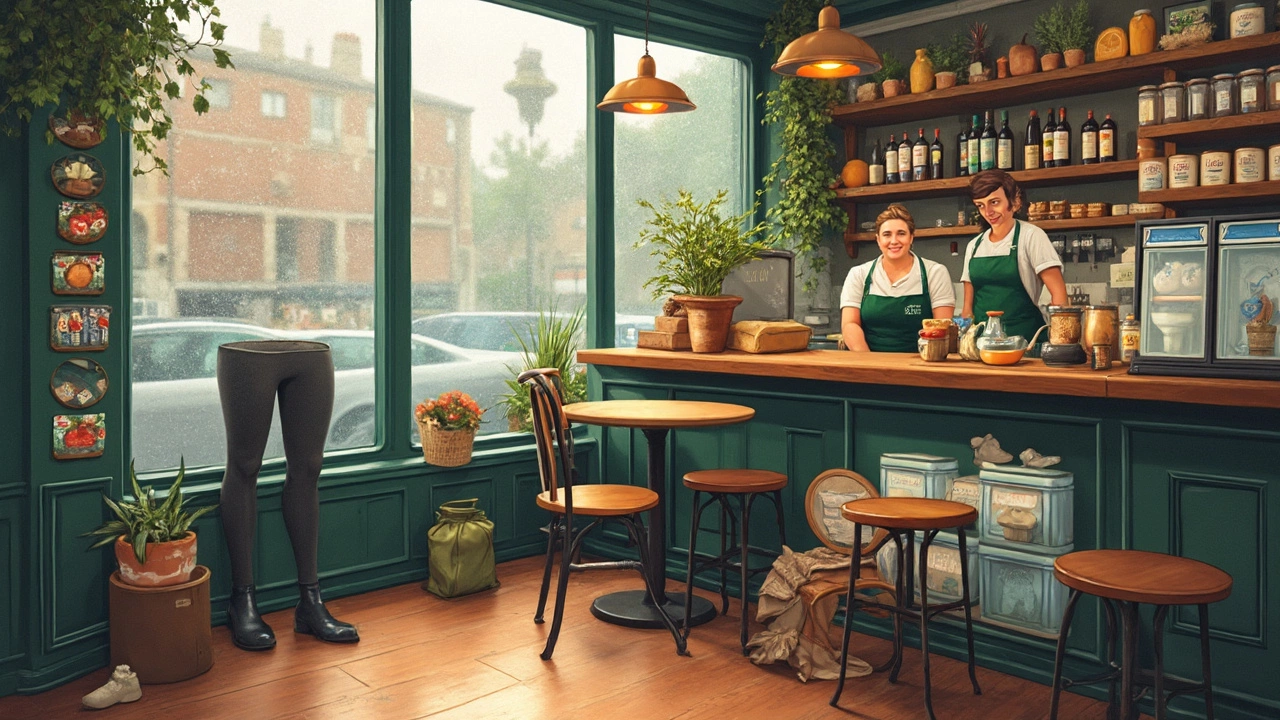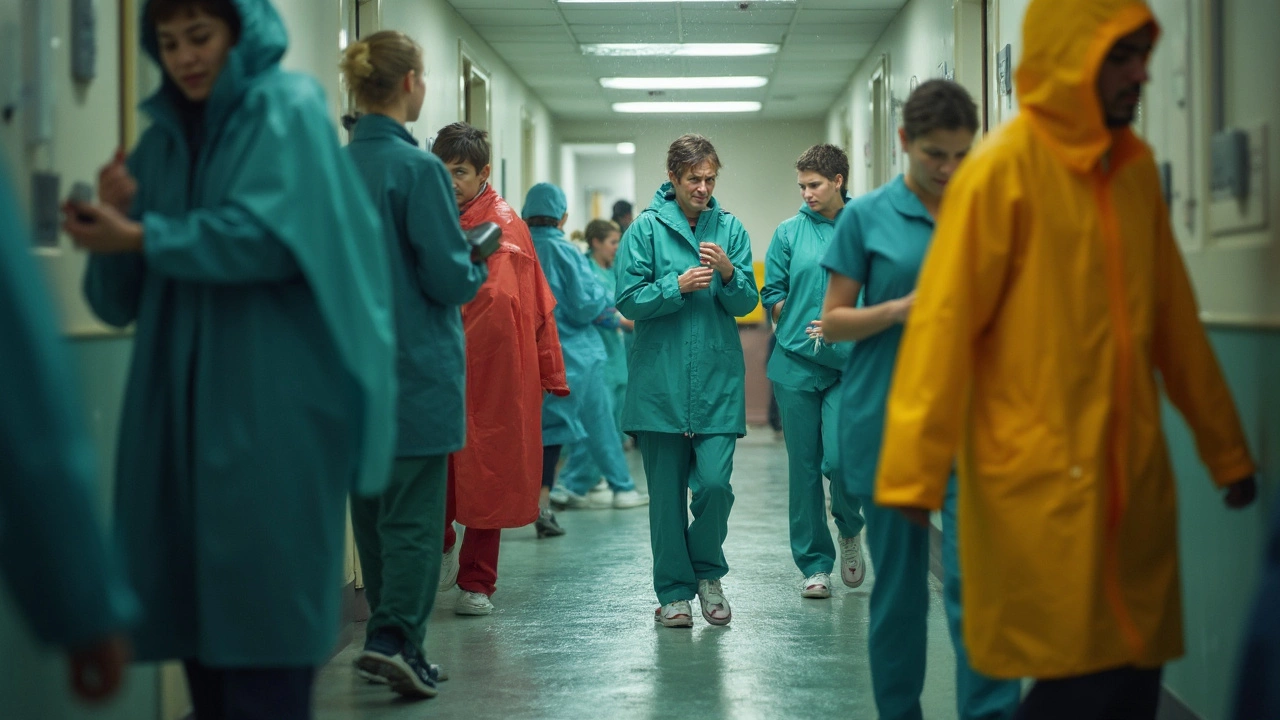No one in Ireland will argue: standing for twelve hours straight isn’t just tough, it’s nearly an Olympic sport. Whether you’re managing the Friday rush in Dunnes, dashing from ward to ward in the Mater, or pouring pints on Grafton Street until close, your feet take a serious pounding. Forget the one-size-fits-all advice from abroad—what works in Spain or Canada might be useless here, where rain, cold, and concrete are your daily companions.
If your shift drags on for half a day, a few simple choices can instantly take the sting out of each step. Step one, literally: start with your shoes. Irish weather laughs at flimsy runners, so go with waterproof options—Clarks, Dubarry, and Ecco pop up in break rooms everywhere for good reason. Hospitals often require non-slip soles; the Skechers Work range is a local hit for that, and they don’t look half-bad, either.
Here’s something most newcomers miss: get your shoes properly fitted. Most Intersport Elverys or Vaughan Shoes staff know which brands keep swelling toes happy after hour eight, and they rarely go for style over substance. There’s no shame in adding insole supports, either—most pharmacies from Cork to Sligo have memory foam insoles that bring instant relief for less than a tenner.
- Choosing the Right Shoes for Irish Conditions
- Smart Habits During Your Shift
- After-Work Recovery and Irish Remedies
- Local Resources and Tried-and-Tested Brands
Choosing the Right Shoes for Irish Conditions
Nobody handles 12 hour shift Ireland style without shoes that have your back, especially with our classic Irish rain. Whatever your job, from a barista in Galway’s Latin Quarter to a nurse on a Dundalk ward, the wrong shoes wreck your day fast. So how do you pick something that survives puddles and hours on your feet?
First up: waterproofing. Leather options from Clarks or Dubarry stand up to sidewalk rain and surprise spills way better than mesh joggers. If you’re in hospital or hospitality, non-slip soles are non-negotiable. Skechers Work and Ecco both offer grip that can handle everything from greasy kitchen floors to hospital corridors.
Don’t fall for the ‘all-day comfort’ marketing alone. Proper fit is everything. Irish feet tend to swell during those long stretches—especially after lunchtime. Get measured at an actual shop (Vaughan Shoes, Elverys, or even Brown Thomas in Dublin have proper foot-measuring services). The difference is immediate, with less pinching and fewer blisters by the end of your standing long hours.
Custom insoles make a world of difference, too. Superfeet and Scholl sell memory foam and gel options in pharmacies and sports shops from Cork to Limerick. If you want long-term comfort, swap out the basic insole for something with proper arch and heel support. This is especially handy for anyone walking between city bus stops or hustling over the hills in smaller towns.
- Double-check your workplace dress code to dodge accidental uniform violations.
- Rotate pairs if you can—wet shoes only get worse as hours tick by.
- If you work in a hospital, Irish HSE guidelines demand closed shoes, no perforated fabrics, and easy-clean options. Crocs (with backs, not holes) actually count, and everyone sneaks a pair for those double shifts.
If you want real-world proof, a recent survey of retail staff in Dublin said over 65% rated waterproof shoes as their top priority, above even style or price. Local brands and outlets are catching on, stocking more durable options now than five years ago.
Invest up front, and your feet (and back) will thank you by week’s end. Even the nicest shift in Ireland gets ruined quickly with the wrong pair. Prioritise comfort and get some expert sizing help locally—it’s a total game changer for anyone braving work shoes Ireland conditions.
Smart Habits During Your Shift
Getting through a 12 hour shift in Ireland isn’t just about toughing it out—you can make it a lot easier by building some simple habits right into your workday. Whether you’re behind a bar in Temple Bar or managing a Tesco till, these practical tips will help keep your feet and energy from giving up before clock-out.
First off, don’t underestimate the power of moving around. Standing still at a till zaps your legs quicker than brisk walking between shelves. Shift your stance often, wiggle your toes, or step in place every twenty minutes. Most physiotherapists in Ireland back this up: micro-movements help boost circulation and stop nasty swelling or pins and needles.
Hydration makes a difference, especially with heating cranked up in the winter. But instead of downing loads of water at once, keep a reusable bottle (most staff rooms, from Dublin hospitals to Ennis supermarkets, have free refill stations). Take sips throughout your shift, and you’ll avoid dehydration headaches and fatigue.
If you get breaks, use them wisely. Here’s what works best for Irish workers:
- Sit with your feet elevated—stack up whatever’s handy, even a few delivery crates.
- Do quick calf stretches or roll an empty water bottle under your arches to ease pressure.
- Avoid heavy meals; go for small snacks like banana and oat bars, a local favourite, to keep your blood sugar steady.
Don’t skimp on socks, either. Most seasoned workers go for seamless, moisture-wicking socks—any busy pharmacy stocks these. Wool blends like Irish-made Foxford stand up to both damp weather and sweaty shoes.
Combining these standing long hours hacks can chop your discomfort in half. You’ll notice your back and knees ache less by the end of your shift, which means you’re more likely to make the most of your time off, too.
| Smart Habit | Benefit |
|---|---|
| Micro-movement breaks | Improves circulation, reduces swelling |
| Regular hydration | Prevents fatigue and headaches |
| Proper socks | Cuts down on blisters and sweat |
| Stretching at breaks | Lowers muscle stiffness and soreness |

After-Work Recovery and Irish Remedies
When your 12-hour shift finally ends, you’re not the only one dreaming of a proper wind-down. Irish weather might deal out the aches and pains, but this country has its own bag of tricks for dealing with sore legs and tender feet. First thing’s first—kick off those work shoes. Give your toes room to wiggle. Honestly, standing jobs in Ireland can leave your feet swollen, so loose slippers or socks are your best pals once you’re in the door.
A lot of Irish workers swear by Epsom salt soaks. Toss a handful into a basin with hot water—brands like Doctor Teal's are easy to find at Boots or your local pharmacy. The magnesium in Epsom salts is meant to help soothe muscle pain and reduce swelling. Add a drop of tea tree oil if you want things extra fresh (and it helps with blisters).
Here’s where local habits make a difference. You’ll find plenty of folks in Ireland using a hot water bottle straight out of the press—wrap one in a towel, rest your feet on it while binge-watching RTÉ, and you’ll loosen up in no time. If your back or calves are screaming, use a foam roller or a rolling pin. Most athletes’ supplies in Lifestyle Sports will have what you need.
- Drink loads of water after your shift. Standing long hours leads to dehydration—even if you don’t notice it right away.
- Put your feet up—literally. Lie on the sofa and prop your heels on the armrest. It helps your blood drain back up and eases swelling fast.
- If your feet are cracked (and in Ireland, they probably are in winter), rub in some O’Keeffe’s Healthy Feet cream. Ask in your nearest pharmacy, it’s stocked everywhere from SuperValu to McCabes.
- Compression socks aren’t just for the airport. Loads of Irish nurses grab them for double shifts—they reduce fatigue and keep your legs from feeling like bricks.
Now, don’t forget recovery isn’t only physical. Take a minute to mentally clock out—listen to Lyric FM, or swap stories with housemates. If you’re sore after a few shifts in a row, physio sessions aren’t just for GAA athletes. Many clinics offer group discounts to local hospital teams—check out offerings in Galway or Waterford, they’re surprisingly affordable.
Most folks underestimate how vital recovery is for anyone working long hours on their feet in Ireland. It’s not about fancy gadgets—it’s about simple steps that keep those 12 hour shifts bearable week after week.
Local Resources and Tried-and-Tested Brands
If you’re facing a 12 hour shift Ireland style, the temptation to just grab a random pair off the rack won’t cut it. Your best bet is to shop local, since Irish retailers actually listen to feedback from folks on their feet all day—and carry what actually works for hospital, warehouse, or retail staff here.
Dubliners often swear by Vaughan Shoes and Intersport Elverys. These shops stock popular brands like Ecco (with their shock-absorbing soles), Dubarry (famous for waterproofing—ideal when it’s lashing rain outside), and Skechers Work (which keep popping up on most Irish hospital floors). If you need advice, sales assistants at these stores are usually clued in; they know what’ll last, what’s comfortable after hour ten, and if a style meets those typical Irish workplace rules.
For those in the food or hospitality game, Clarks, Timberland, and Safety Direct have great options with non-slip soles. And many public sector staff recommend checking Safety Direct online, since they deliver across Ireland (especially handy for rural workers or anyone who can't get to a city easily).
Local pharmacies like Hickey’s or McCabes are goldmines for extra insole cushions, compression socks, and blister treatments. They also tend to stock plasters designed to hold up during marathon shifts. Pharmacies around Galway, Limerick, and Waterford keep these well stocked for one big reason—demand is constant from the local workforce.
You might wonder if Irish workers really spend on top brands or just settle for cheaper options. A 2024 survey by jobs.ie found that 58% of Irish retail and healthcare workers are willing to pay €100 or more for quality work shoes Ireland, just to keep pain and injuries at bay. Here’s a quick comparison of local favourites and what they’re known for:
| Brand / Shop | Known For | Average Price (€) |
|---|---|---|
| Skechers Work (at Vaughan Shoes) | Non-slip, lightweight, hospital-ready | 70–120 |
| Dubarry (various) | Waterproof, lasts ages, good for Irish weather | 130–200 |
| Clarks (multiple chains) | Wide fit, classic style, decent support | 80–150 |
| Safety Direct | Worksite approved, delivery nationwide | 50–100 |
Don’t forget Irish Facebook groups like “Irish Nurses & Midwives” or “Dublin Bartenders” often have honest shoe reviews from real workers, not just sales pitches. Sometimes you’ll even find weekend sales or discount codes floating around.
Bottom line? Buying locally doesn’t just support communities—it usually means shoes and gear that actually work for standing long hours in Irish conditions. No frills, just what you need to get through the toughest days.”
